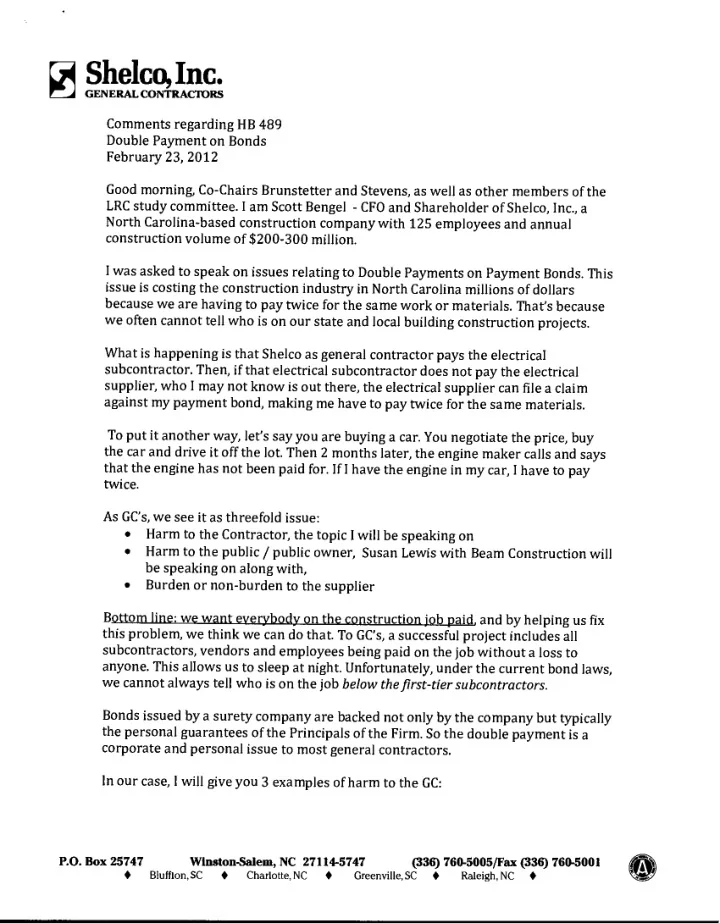

� � Shelco, Inc. i GENERAL CONTRACTORS Comments regarding HB 489 Double Payment on Bonds February 23, 2012 Good morning, Co-Chairs Brunstetter and Stevens, as well as other members of the LRC study committee. I am Scott Bengel - CFO and Shareholder of Shelco, Inc., a North Carolina-based construction company with 125 employees and annual construction volume of $200-300 million. I was asked to speak on issues relating to Double Payments on Payment Bonds. This issue is costing the construction industry in North Carolina millions of dollars because we are having to pay twice for the same work or materials. That's because we often cannot tell who is on our state and local building construction projects. What is happening is that Shelco as general contractor pays the electrical subcontractor. Then, if that electrical subcontractor does not pay the electrical supplier, who I may not know is out there, the electrical supplier can file a claim against my payment bond, making me have to pay twice for the same materials. To put it another way, let's say you are buying a car. You negotiate the price, buy the car and drive it off the lot. Then 2 months later, the engine maker calls and says that the engine has not been paid for. If I have the engine in my car, I have to pay twice. As GC's, we see it as threefold issue: • Harm to the Contractor, the topic I will be speaking on • Harm to the public / public owner, Susan Lewis with Beam Construction will be speaking on along with, • Burden or non-burden to the supplier Bottom � v � and by helping us fix this problem, we think we can do that. To GC's, a successful project includes all subcontractors, vendors and employees being paid on the job without a loss to anyone. This allows us to sleep at night. Unfortunately, under the current bond laws, we cannot always tell who is on the job below the first - tier subcontractors. Bonds issued by a surety company are backed not only by the company but typically the personal guarantees of the Principals of the Firm. So the double payment is a corporate and personal issue to most general contractors. In our case, I will give you 3 examples of harm to the GC: P.O. Box 25747 � Winston-Salem, NC 27114-5747 � (336) 760-5005/Fax (336) 760-5001 • Bluffton, SC � • � Charlotte, NC � • � Greenville, SC • � Raleigh, NC •
Shelco has lost about $700,000 in the last 4 years due solely to double payment problem with our bond laws. And we feel we are pretty tight with our payment and monitoring processes. • For example, Shelco has one mechanical sub that will create a loss of nearly $200,000 due to double payment to "hidden" claimants we were not aware of when he abandoned the job. • You may ask: so why not bond all the subs? 1. Subs cannot always get bonds due to their credit which could potentially rule out the Small and Emerging Businesses. 2. Sometimes the subcontractor's bid is so low that bonds won't be effective. 3. Such bonding drives up the cost which the GC has to pass directly to the owner/client. • Others ask: Why don't GC's know who is on our jobs? 1. We will know the first tier subcontractors. 2. A typical project could include approximately 150-200 subs and suppliers. 3. A subcontractors' supplier list may be amended or changed several times during the job as buyout does not happen on day 1. This is constantly moving our target. 4. As perspective, Shelco did 262 jobs last year with approximately 39,300 companies on the various jobs. I have 7 Accounts Payable staff and 28 Project Manager's. Under the current law, credit underwriting is leveraged to the GC and its surety, and suppliers don't face as much risk: • Lower tier's simply ask: Is the job bonded? If there is a problem, the lower tier sub or supplier will simply file a bond claim with proof of delivery to the bonded job. • Currently, if the job is bonded, there are no credit constraints or monitoring for the shipments to the job. • We not asking today that you eliminate our responsibility to make sure these subs and suppliers are paid. We just want to know who they are so we can do so. Internal Staff Costs to track: • With credit risk shifted to Shelco, approximately 25% of my staff's time (or approximately $125,000 in payroll alone) is dedicated to the additional steps of indentifying and tracking suppliers/ subcontractors. This includes: 1. Increased subcontractor underwriting: calling bank, surety and trade references, reviewing financial statements, pulling D&B reports. 2. Increased communications with the subcontractors for complete lists of suppliers on the job as these change throughout the job. 3. More diligence on proof of payment to suppliers through lien waiver form requests, PM review and approvals. 4. Tracking shipments to jobs to ensure they are to our projects. Shelco,Inc.
5. Increased joint checks to force payment for those riskier subcontractors. On the above mechanical sub, we wrote 50 joint checks on one job thus costing • us $1,000 in staff time for ONE SUB on ONE JOB. Keep in mind, Shelco had approximately 39,300 companies on our jobs in 2011. With this legislation, we would have known the hidden suppliers earlier, • redirected funds and cut fewer joint checks. This would cut my cost at least in half and likely gotten most all suppliers paid. The recommendation in HB 489 is for lower tier subs and suppliers to simply provide a notice to the GC to preserve the bond claim rights they have under current law. The process is similar to the current North Carolina lien laws that suppliers are used to managing already. Thank you so much for your time today. Shelco, Inc.
Recommend
More recommend